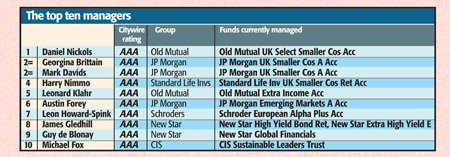Get the latest financial news, insights and expert analysis from our award-winning MoneyWeek team, to help you understand what really matters when it comes to your finances.
You are now subscribed
Your newsletter sign-up was successful
Want to add more newsletters?

Twice daily
MoneyWeek
Get the latest financial news, insights and expert analysis from our award-winning MoneyWeek team, to help you understand what really matters when it comes to your finances.

Four times a week
Look After My Bills
Sign up to our free money-saving newsletter, filled with the latest news and expert advice to help you find the best tips and deals for managing your bills. Start saving today!
Given the overwhelming response to Anthony Bolton's exit from Fidelity, you'd think a manager was the only thing to worry about when choosing a fund. Certainly, some managers a very select minority have proved consistent outperformers. Citywire.co.uk has a comprehensive breakdown of all UK fund managers' performances. Managers with an A or AA rating are better than average, while those with an AAA rating are in the top 5% of all UK fund managers. The rating is calculated according to the amount of risk a manager takes on and their performance against their own benchmark over a three-year period.
Choosing an investment fund: the top ten managers

But it's not just about past performance, which, as fund groups always warn us, is no guide to the future. A study by David Finstad, published in the Canadian Investment Review in 2005, found there are four things investors should look for: ownership, low staff turnover, diversification and a bottom-up approach to investing. Finstad suggests investors should buy into small, boutique investment firms rather than larger ones. A fund manager in a boutique is more likely to have some ownership stake in the firm, and thus more incentive to outperform. Fund managers with a share in the business are also less easily poached by rivals, meaning the fund will benefit from more stability. Boutiques also tend to be less diversified than larger rivals, who prefer to minimise risk, which can hit returns. And a bottom-up stock-picking approach rewards genuinely active managers who make bold choices, rather than those who hug their benchmark index.
But remember that no matter how good a manager is, they'll have a tough time delivering decent overall returns if their favoured sector is performing poorly. You should be wary of funds being promoted on the back of strong recent returns last year's winners often turn out to be this year's losers. For example, in recent years commercial property funds are being pushed in the wake of huge private-investor interest, yet even the most bullish forecasters reckon the sector is set to slow. Fees also make a big difference. The underlying performance of unit trusts and investment trusts over time is similar, but when charges are taken into account investment trusts win, because their fees are usually about a third of those charged by unit trusts. Tracker funds and exchange-traded funds are even cheaper, because there is no need to pay an expensive fund manager. And given that most managers fail to beat their benchmark, we'd suggest that it's this last factor cost that should be your biggest concern when choosing a fund.
MoneyWeek
Subscribe to MoneyWeek today and get your first six magazine issues absolutely FREE

Sign up to Money Morning
Don't miss the latest investment and personal finances news, market analysis, plus money-saving tips with our free twice-daily newsletter
Don't miss the latest investment and personal finances news, market analysis, plus money-saving tips with our free twice-daily newsletter
Get the latest financial news, insights and expert analysis from our award-winning MoneyWeek team, to help you understand what really matters when it comes to your finances.
MoneyWeek is written by a team of experienced and award-winning journalists, plus expert columnists. As well as daily digital news and features, MoneyWeek also publishes a weekly magazine, covering investing and personal finance. From share tips, pensions, gold to practical investment tips - we provide a round-up to help you make money and keep it.
-
 Can mining stocks deliver golden gains?
Can mining stocks deliver golden gains?With gold and silver prices having outperformed the stock markets last year, mining stocks can be an effective, if volatile, means of gaining exposure
-
 8 ways the ‘sandwich generation’ can protect wealth
8 ways the ‘sandwich generation’ can protect wealthPeople squeezed between caring for ageing parents and adult children or younger grandchildren – known as the ‘sandwich generation’ – are at risk of neglecting their own financial planning. Here’s how to protect yourself and your loved ones’ wealth.

